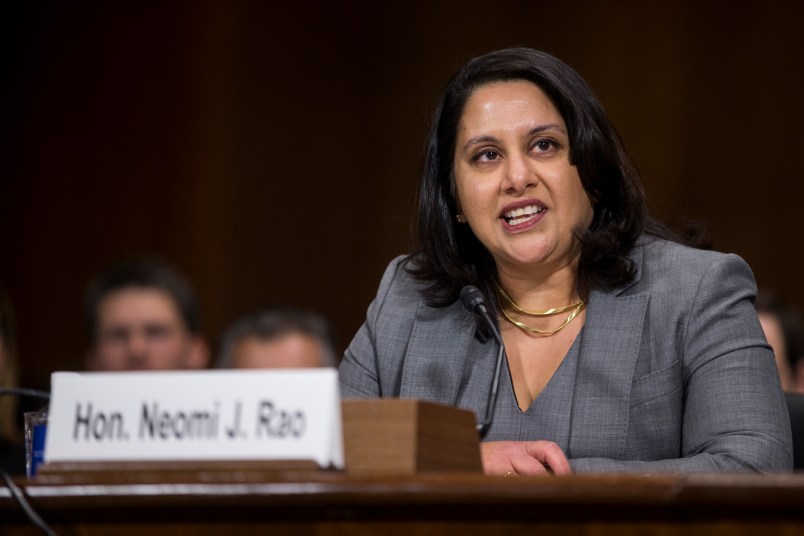A Trump-appointed appeals court judge and the House’s top lawyer tangled for several minutes Friday over the idea that court could authorize the Justice Department to release special counsel Robert Mueller’s grand jury materials, but not compel it to.
The lawyer, House General Counsel Douglas Letter, said the premise D.C. Circuit Judge Neomi Rao laid out in her question was “stunning” and “astonishing.” He said as a former DOJ attorney himself, he “would have been embarrassed” if he had to tell a court that the Department would not produce the documents once a court authorized their release.
Even the Justice Department lawyer arguing against disclosure of the materials at Friday’s hearing distanced the Department from the hypothetical Rao was pushing.
The extended exchange highlighted the high-stakes nature of this and other court battles between the House and President Trump over the House’s ability to investigate him.
Letter suggested that, if the Department continued to withhold the grand jury materials even after the court authorized their release, the House would then send its Sergeant of Arms to the Department to pick them up. Letter pointed out that that possibility got at the ridiculousness of not expecting a court to adjudicate a dispute like the grand jury materials one, as Rao implied that the court did not have the power to compel the Justice Department to release the documents.
While Rao was not expected to rule in favor of the House regardless, her pounding away at the hypothetical illuminated the position that the Trump administration’s unprecedented obstruction had put the House in. She asked Letter repeatedly to state which cases — if any — before this one resulted in a court order that compelled the Department to release the records, rather than just authorize the disclosure.
“There hasn’t been a need for compulsion,” Letter said, because the Justice Department has never opposed the release of grand jury materials once there has been a final court ruling saying the Department was permitted to.
Friday’s hearing was in an appeal by the Trump administration seeking that the U.S. Court of Appeals for the D.C. Circuit reverse a district judge’s decision authorizing the disclosure of the materials — or at the very least, send the case back for the district court to re-examine in light of what the House has done on impeachment since the district judge’s decision.
The House committee brought the lawsuit in July, after the Justice Department claimed that disclosure of the materials would violate a federal rule mandating grand jury secrecy.
In October, U.S. District Judge Beryl Howell — the chief judge of the federal court in D.C. who supervised Mueller’s grand jury there — ruled the disclosure of the materials was permissible because the House’s impeachment inquiry fit under an exemption in grand jury secrecy law for judicial proceedings.
Some of Friday’s hearing focused on what the impeachment developments since Howell’s ruling meant for the case. The House adopted impeachment articles last month that focused on Trump’s behavior towards Ukraine, conduct that occurred after Mueller’s investigation.
The House has argued that it is considering bringing additional articles of impeachment depending on what evidence it finds in the grand jury materials. It also says the materials could help the House buttress its impeachment case in the upcoming Senate trial, as parts of the Mueller report touch on aspects of the Ukraine controversy.
The Trump administration meanwhile has argued that an impeachment inquiry does not fit under the grand jury law’s exemption for judicial proceeding. It also says that the adoption of impeachment articles not focused on Mueller requires Howell to at a minimum reexamine her finding that the House had proved it had a particularized need for the materials.
D.C. Circuit Judge Thomas Griffith, a George W. Bush appointee who was seen as the swing vote on Friday’s three-judge panel, seemed skeptical of the Justice Department’s claim that impeachment did not fit into the grand jury secrecy exemption for judicial proceedings.
Griffith noted that the DOJ’s current position was a departure from what it has argued in previous grand jury material cases, and a departure from the historical precedent of grand jury materials being produced for impeachment proceedings.
He also brought up Alexander Hamilton’s writings about impeachment, while also jokingly alluding to the musical “Hamilton.”
“I don’t think there’s a song about Federalist 65, but it’s there,” he told DOJ attorney Mark Freeman.
But he also seemed sympathetic to the idea that Howell would need to take a closer look at which of the grand jury materials the House was requesting it was actually entitled to. He asked Letter about how he expected Howell to decide whether the House had proved it’s need for the materials without the judge going through the materials themselves.
“She’s flying blind on this,” Griffith said.



